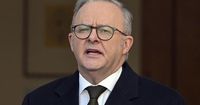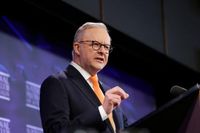Australia’s Prime Minister Anthony Albanese has announced a landmark shift in foreign policy: the country will formally recognize a Palestinian state at the United Nations General Assembly this September. The move, declared on August 11, 2025, places Australia alongside France, Britain, and Canada in lending official legitimacy to Palestinian statehood—a step that breaks with the longstanding position of its close ally, the United States. Albanese’s decision comes in the wake of mounting domestic and international pressure, as well as deepening humanitarian concerns in the Gaza Strip.
"A two-state solution is humanity’s best hope to break the cycle of violence in the Middle East and to bring an end to the conflict, suffering and starvation in Gaza," Albanese stated following a Cabinet meeting, according to France 24. He described the situation in Gaza as having "gone beyond the world's worst fears," with more than two million people facing famine due to Israel’s deliberate withholding of vital humanitarian aid, as reported by United Nations agencies. Since the deadly Hamas-led attacks on Israel on October 7, 2023, more than 61,000 Palestinians have been killed by Israeli military action, according to France 24.
The recognition, which will be formalized at the 80th session of the UN General Assembly, is not without conditions. Albanese outlined that Hamas must not hold any roles in a future Palestinian government, Gaza must be demilitarized, and credible elections must be guaranteed. He emphasized that he has received assurances from the Palestinian Authority that Hamas will play no role in any eventual state.
Australia’s decision comes amid growing criticism of Israeli Prime Minister Benjamin Netanyahu’s government, particularly after a renewed military offensive in Gaza was announced on August 10, 2025. Albanese did not mince words, stating, "The Israeli government continues to defy international law and deny sufficient aid, food and water to desperate people, including children." He further called for Hamas to return Israeli hostages held since October 7, 2023.
Netanyahu, for his part, lashed out at Australia and European countries for their recognition of Palestine. "To have European countries and Australia march into that rabbit hole ... this canard, is disappointing and I think it’s actually shameful," he said, as quoted by TNND. The statement underscores the deepening rift between Israel and several Western nations over the path forward in the Middle East.
Australia’s move represents a significant departure from its usual close alignment with US foreign policy in the region. The United States has consistently opposed unilateral recognition of a Palestinian state, arguing that such recognition should only come as the final step in a negotiated peace process between Israel and the Palestinians. The Trump administration, in particular, has accused countries recognizing Palestine of "rewarding Hamas" for its attacks on Israel, according to France 24.
Conservative opposition within Australia was swift and pointed. Sussan Ley, the opposition leader, criticized the government’s decision, arguing that it "puts Australia at odds with the United States of America, our most important ally, and the most consequential player in the conflict in Gaza." The move, she suggested, risks undermining Australia’s standing with its key security partner and could have unpredictable diplomatic repercussions.
But Albanese’s government appears undeterred by such warnings, reflecting a more independent streak in Australian foreign policy. As Martin Kear, a lecturer at the University of Sydney, told France 24, "It’s not unusual for Labor governments to strike a particularly independent foreign policy that, while it doesn’t run contrary to the United States, certainly differs in some areas." Kear added that the government’s decision is "very much in line with what this government is doing here – it’s saying, ‘These are Australian positions, we’re not disagreeing with the United States, we’re simply taking a different point of view on this particular issue.’"
The recognition of Palestine by Australia is part of a broader trend among Western democracies. Nearly 150 of the 193 United Nations member states have now recognized Palestinian statehood, many of them decades ago. The recent moves by France, Canada, and the UK (conditional), as well as Australia, suggest a coordinated effort to apply diplomatic pressure on Israel and to revive the moribund two-state solution. French President Emmanuel Macron has publicly encouraged other Western nations to follow suit, seeing strength in numbers and a collective push for renewed negotiations.
Domestic pressures have also played a role in Australia’s decision. The Australian Labor Party has long harbored factions supportive of Palestinian statehood, and recent human rights abuses in Gaza have intensified calls for change. Weekly protests in cities like Sydney, as well as the presence of large Muslim and Arab communities in key electoral districts, have added to the political calculus. As Kear explained, "There’s a lot of domestic discontent... This is a way of governments saying, ‘We understand your distress, we’re responding to that.’"
Yet, the decision has drawn criticism from both Australian Jewish and Palestinian groups, albeit for different reasons. Israel’s envoy to Australia, Amir Maimon, posted on social media, "By recognising a Palestinian state now, Australia elevates the position of Hamas, a group it acknowledges as a terrorist organisation." Meanwhile, Nasser Mashni, President of the Australia Palestine Advocacy Network, lamented that the recognition came too late and would do little to end what he called the "ongoing genocide in Gaza which has been live streamed for the entire world for two years."
Albanese’s conditions for recognition—excluding Hamas from government, demilitarizing Gaza, and ensuring elections—reflect the complexities of the situation. Some analysts, like Kear, caution that excluding Hamas entirely could undermine the legitimacy of any future Palestinian elections, given the group’s popularity among Palestinians. "If Hamas are excluded, they simply won't [see elections as legitimate], and we run a very great risk of repeating the mistakes of Iraq and Afghanistan," Kear warned.
Australia’s recognition of Palestine is a bold diplomatic step, one that signals both a response to international outrage over the humanitarian crisis in Gaza and a willingness to chart an independent course in foreign policy. Whether this move will make a tangible difference on the ground remains uncertain, as the path to a two-state solution remains fraught with obstacles and entrenched positions on both sides. What is clear, however, is that Australia has joined a growing chorus of nations demanding change—and the world will be watching closely as events unfold at the United Nations in September.


